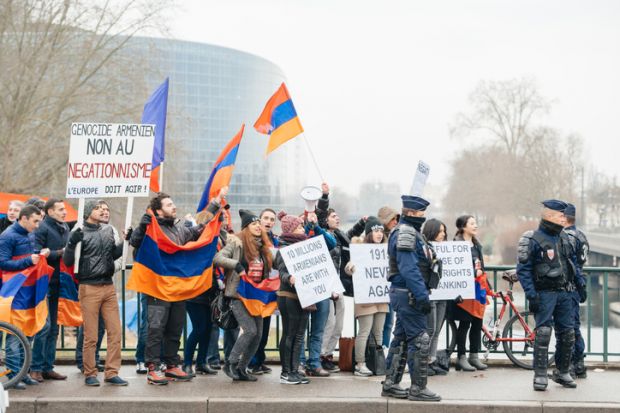Academics have reacted with alarm after Turkey announced plans to set up a research institute that dismisses the Armenian genocide as “baseless”.
The move has been seen as the latest attempt by the country to play down massacres of Armenians by the Ottoman Empire during the First World War. The International Institute for Genocide and Crimes against Humanity, set up by Turkey’s Council of Higher Education to “do research on genocide and crimes against humanity”, will be based in a yet-to-be-chosen university.
The English-language version of the council’s announcement stated that the institute “not only aims to do research on the so-called genocide allegations regarding the Armenians, but also to do research on crimes against humanity that are taking place all around the world, from America to Asia”.
The Turkish version of the announcement was much more strongly worded, referring to “allegations” of genocide against Armenians as “baseless”.
Henry Theriault, president of the International Association of Genocide Scholars, said the organisation had “passed multiple resolutions recognising that the 1915 Armenian genocide is an incontrovertible historical fact and that this is the consensus of all credible scholars”.
“By implication, any ‘institute’ set up putatively to study genocide that does not recognise this historical fact lacks academic credibility,” he said.
Speaking personally, he added that the institute was “clearly another part of the Turkish denial campaign” that has involved the creation of “denialist” academic journals.
Despite near consensus among historians and recognition of the genocide by dozens of countries, Turkey has instead painted the deaths of hundreds of thousands of Armenians as a “grim story of serious inter-communal conflict” as the Ottoman Empire crumbled.
Some scholars have likened such denial to tobacco lobbying in the 1950s or climate change denial, creating “manufactured controversy” to lend legitimacy to the Turkish state’s position.
Last year, Turkey reportedly announced it would set up a new body to deal with “allegations” around the “1915 incidents”. It is unclear whether this new institute was the body in question; the Council of Higher Education did not respond to multiple requests for comment from Times Higher Education.
As far back as 2001, the Turkish government set up a “Committee to Coordinate the Struggle with the Baseless Genocide Claims”, involving senior government officials.
“This current initiative would seem to follow the same perverse yet predictable logic,” said Marc Mamigonian, director of academic affairs at the US-based National Association for Armenian Studies and Research.
“While presumably intended to show the world how deeply Turkey cares about genocide and human rights issues, the new institute wears its agenda, ie, defining genocide as anything other than what was done to the Armenians, on its sleeve,” he said.
A spokesman for Bilim Akademisi, a Turkish academic academy founded after fears the country’s official academy had been co-opted by the government, said that the institute’s remit was an “issue of concern” that would be discussed further. The announcement had not yet attracted any attention in Turkey itself, the body said.
后记
Print headline: Outcry over Turkish research institute’s dismissal of Armenian genocide




